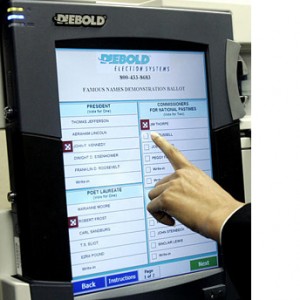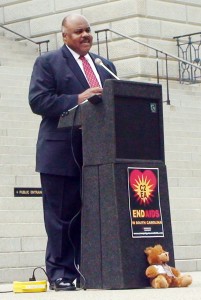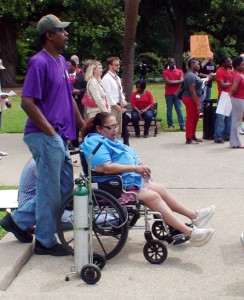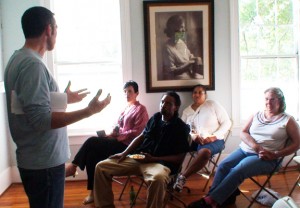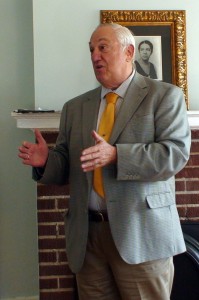If the 46 county election offices are not stopped, within days they will erase the most critical data from the memories of all the voting machines, warns SC Progressive Network Director Brett Bursey. With controversy over the reliability of the touch-screen computers heating up, the Network is working to ensure that valuable information is not lost as counties prepare the machines for the upcoming run-off elections.
Bursey explained that the state Election Commission only keeps a summary of the information from the counties, and that only by preserving or copying the flash cards (memory chips) inside the computer will there be enough information to perform an audit.
“There is no way the machines you have in South Carolina can be audited without all the information on the computer flash card in each machine,” Dr. Douglas Jones said. Jones has taught at the University of Iowa Department of Computer Science since 1980, served on the Iowa Board of Examiners for Voting Machines and Electronic Voting Systems from 1994 to 2004, and chaired the board for three terms.
Jones, who serves on the Federal Election Assistance Commission’s Technical Guidelines Development Committee, has performed numerous audits on voting machines like those used in South Carolina. He provided the Network with an affidavit outlining the necessary steps to preserve data for an audit.
“We have been in communication with the US Justice Department’s Voting Rights Section,” Bursey said. “We are arguing that erasing the data violates the federal statute (USC 42-1974) that requires all records in a federal election to be preserved for 22 months.”
Bursey said that if the Justice Department doesn’t intervene, they will try to get a federal judge to order a halt to erasing the records. “We are not questioning candidates, motives or conspiracy theories,” Bursey said. “We simply want a trustworthy audit to assure that all votes are counted accurately.”
“It’s not difficult or expensive to copy the flash card,” Dr. Jones said. “You can hook up a flash card reader that you use to download pictures on your computer from a digital camera and save the data to a CD.” Replacing the flash card would cost a few dollars for each machine.
The flash card records all actions taken on the machine, the time of the vote or any errors in an “events log.” The “ballot image log” records the actual ballot cast. The detailed information on the flash cards is not saved by the state or counties and is routinely erased to prepare the machines for the next election.
Even as the calls increase for investigations into several races, counties will erase the data and install the ballot program for the June 22 runoff. “In a matter of days, there won’t be any way to determine whether the machines played a role in the unusual vote counts,” Bursey said. “We simply want a trustworthy audit to assure that all votes are counted accurately.”
Sen. Phil Leventis (D-Sumter) has sponsored legislation to require voting machines to produce a voter-verifiable paper record that can be used to recount or audit an election.
“With these machines not only is there no paper trail to examine, if the records are erased it’s like cremating the body before the autopsy is performed,” he said.
The Network presented expert testimony at a SC Election Commission Board meeting in 2004, urging the agency not to buy the iVotronic computers that do not have a voter verified paper record. SC is one of four states that has neither a paper record nor a regular audit of its machines.

